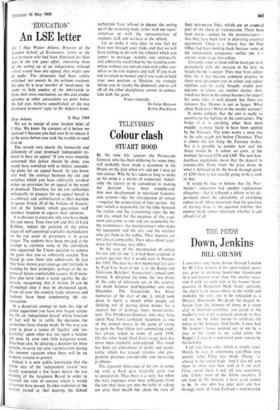Colour clash
TELEVISION STUART HOOD
By the time this appears the POstmaster General, who has been dithering for some time, will probably have _made a statement in the House on the date when al/ and BBC I may go into colour. Why he has taken so long to make up his mind is a matter of conjecture. Admit- tedly the factors to be considered in making the decision have been complicated. Any new development in television transmis- sion systems—like the introduction of colour —requires the cooperation of four parties: the GPO, which is responsible for the links between the studios and the transmitting sites; the Bac and 1TA , which for the purposes of this argu- ment can count as one and are responsible for the transmitters; the manufacturers who make the equipment and the sets; and the retailers who get them to the public. Their interests are not always compatible. Their ideas about target dates, for instance. may differ.
In the case of the introduction of colour for try and for BBC I, it had been assumed in certain quarters that it would start in Novem- ber 1969. The date was first mentioned last year by Paul Fox, head of BBC 1, at the Radio and Television Retailers' Association's annual con- ference. It delighted the RTRA. for this thirds of the sales of television sets in this country are made between. mid-September and mid- December. The Association has bitter memories of the start of BBC 2, which took place in April. a month when people are thinking not of putting down money for a receiver but of package tours. motor-cycles, cars. The Postmaster-General, who may have taken Paul Fox's confident statement as one of the normal moves in the game of trying to push the Post Office into committing itself, has always talked in terms of early 1970. On the other hand. Paul Fox's target date has never been explicitly contradicted. The result has been an atmosphere of doubt and uncer, tainty which has caused retailers and pro- gramme planners considerable and increasing problems.
The apparent reluctance of the GPC to come up with a hard date naturally gave rise to speculation. Thus there is a story that when the 1TA'S engineers meet their colleagues from the cgo they have got into the habit of asking not after their health but about the state of their microwave links, which are an essential part .of the chain of transmission. There have been stories—denied by the manufacturers— that they have been slow in delivering essential equipment. There is a theory that the Post Office had been holding back, because some of the independent companies—unlike BBC t- are not ready to go into colour.
Certainly some of them will be hard put to it.
particularly with the increase in the levy, to match the BBC's output. They may have colour .film, for it has become common practice to shoot most documentaries in colour and colour ,telefilms can he easily bought; studio pro- ductions in colour are another matter. Arv. which has been in the colour business for export for some time, is well placed; but there, are rumours that Thames is not so happy. What about Yorkshire? What of the smaller stations?
It seems unlikely that the GPO is really so sensitive to the feelings of the contractors. The brake—if it is anything other than mere muddle—is more likely to have been applied by the Treasury. The RTRA wants a steep rise in the sales graph just before Christmas. That is almost the last thing the Treasury wishes. Yet it is possible to wonder how real the threat would be. A colour set costs. at the moment, between £250 and £300. The new hire- purchase_ regulations mean that the deposit is ,considerable. Even when the price drops to what is believed to be the break-through point of £200 there is not exactly going to be a rush to buy.
It would be nice to believe that the Post- master's indecision had another explanation altogether— that it reflected a debate in his de- partment about the advisability of extending colour at all. More important than the question of starting dates is the question whether this country needs colour television, whether it can afford it at all.






































 Previous page
Previous page